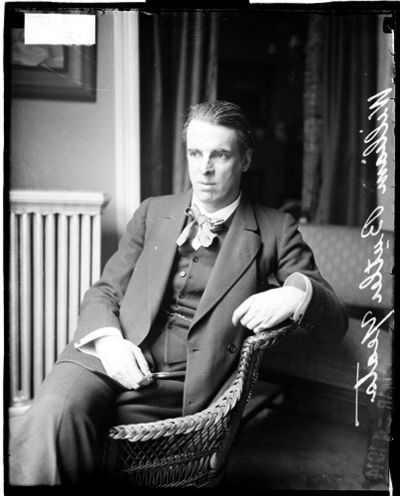William Butler Yeats: Difference between revisions
imported>Subpagination Bot m (Add {{subpages}} and remove any categories (details)) |
imported>Ro Thorpe mNo edit summary |
||
| Line 2: | Line 2: | ||
[[Image:N062238.jpg|thumb|right|400px|William Butler Yeats, 1914. Courtesy of the Chicago Historical Society]] | [[Image:N062238.jpg|thumb|right|400px|William Butler Yeats, 1914. Courtesy of the Chicago Historical Society]] | ||
'''William Butler Yeats''' (June 13 1865 – January 28 1939 | '''William Butler Yeats''' (June 13 1865 – January 28 1939), the greatest lyric poet in English in the late nineteenth and early twentieth centuries, remains a man of enormous contradictions. The nominal leader of the [[Irish literary renaissance]], he spent most of his adult life living in [[London]]; a quiet, sensitive soul, he was a political firebrand who at times seemed to flirt with [[fascism]]; a sometime dabbler in the occult, he was nevertheless a clear-eyed rationalist when it came to literary matters. Poet, playwright, political activist, and banner-carrier for Irish writers generally, Yeats today is perhaps best remembered for his very late poetry, which was filled with richly humane meditations on human age and frailty. In 1923, Yeats was awarded the [[Nobel Prize in Literature]]. | ||
Revision as of 12:30, 29 December 2008
William Butler Yeats (June 13 1865 – January 28 1939), the greatest lyric poet in English in the late nineteenth and early twentieth centuries, remains a man of enormous contradictions. The nominal leader of the Irish literary renaissance, he spent most of his adult life living in London; a quiet, sensitive soul, he was a political firebrand who at times seemed to flirt with fascism; a sometime dabbler in the occult, he was nevertheless a clear-eyed rationalist when it came to literary matters. Poet, playwright, political activist, and banner-carrier for Irish writers generally, Yeats today is perhaps best remembered for his very late poetry, which was filled with richly humane meditations on human age and frailty. In 1923, Yeats was awarded the Nobel Prize in Literature.
